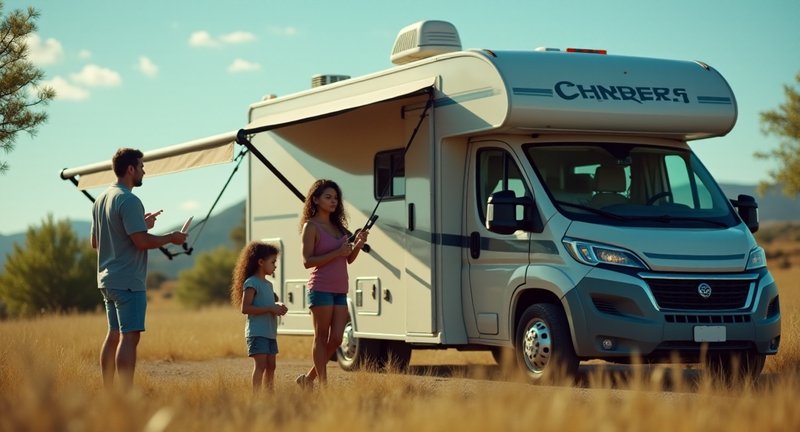Getting Started with Blue Book for Trailer Homes
When discussing navigating the world of trailer homes, the ‘Blue Book for Trailer Homes’ has been my compass. This invaluable resource provides a comprehensive overview, guiding both novice and seasoned trailer enthusiasts through the labyrinth of buying, selling, and maintaining these mobile abodes. Here’s how to get started using this essential guide:
-
Understanding Value: The Blue Book offers a detailed valuation of various trailer models. This helps you determine fair prices, whether you’re buying or selling. Knowing the market value can save you from overpaying or underselling.
-
Informed Decisions: Each entry includes specifications and historical data. This knowledge empowers you to make informed choices about the features that matter most to you. Want a cozy kitchen or ample storage? The Blue Book breaks it down.
-
Maintenance Tips: Beyond pricing, the guide includes maintenance tips that can extend the life of your trailer. Trust me; following these can mean the difference between a smooth journey and a costly repair.
-
Comparison Shopping: With its extensive listings, I often refer back to the Blue Book to compare different models side by side. This is particularly helpful when deciding between two trailers that caught my eye.
-
Future Planning: As a matter of fact, this resource encourages you to think ahead. Understanding the resale value helps you plan your investment for the long haul.
In my experience, the ‘Guidebook for mobile homes’ is more than just a guide; it’s a toolkit that equips you with the insights needed for a successful trailer home adventure. So, grab your copy and start your journey today!

The Use of the Blue Book for Trailer Homes
Navigating the world of mobile living often feels like wandering through a labyrinth. In my adventures with trailer homes, I discovered a handy guide that offers invaluable insights into values and pricing.
Picture this: you’re at a bustling RV show, surrounded by shiny models and eager salespeople. It’s easy to feel overwhelmed, but having a trusty reference can transform you from a casual observer into a savvy buyer. This guide illuminates the path, helping you assess worth and make informed decisions.
As I perused the listings, I found it essential to dive into the details. Each trailer has its unique charm, and understanding its worth can save you from overspending. It’s like having a secret weapon in your pocket, allowing you to negotiate confidently.

But it’s not just about numbers; this resource also sheds light on the broader aspects of ownership. From maintenance tips to insurance recommendations, it’s a treasure trove of knowledge for anyone considering life on the road.
I remember feeling empowered as I consulted it during my own trailer search. It was as if I had a wise friend guiding me through the maze of options.
In a world where mobile living is increasingly popular, tapping into this resource ensures you don’t get lost along the way. It’s an essential companion for anyone ready to embrace the adventurous spirit of trailer life.
Understanding Trailer Home Valuation
Understanding the value of a trailer home can sometimes feel like deciphering a secret code, especially if you’re new to the world of mobile living. From my own journey navigating this unique real estate market, I’ve gathered a few insights that might just help you make sense of it all.
Factors Influencing Trailer Home Valuation:
-
Age and Condition: Just like fine wine, the older a trailer home is, the more character it can have if maintained properly. A well-preserved vintage trailer can command a premium, while one that’s seen better days may drag down the price.
-
Location, Location, Location: The spot where your trailer calls home is pivotal. Proximity to amenities, parks, and scenic views can significantly enhance its appeal.
-
Features and Upgrades: Fancy fixtures or modern upgrades can act like the cherry on top of a sundae. Features like energy-efficient appliances or a freshly renovated bathroom can bump up your home’s value.
-
Market Trends: Just as the tide rises and falls, so do market trends. Keeping an eye on local real estate fluctuations can give you an edge when determining your trailer’s worth.
-
Comparable Sales: Looking at similar homes in your area can provide a solid benchmark. It’s like checking the scorecard before placing your bet.
Valuing your trailer home isn’t just about numbers; it’s about storytelling. Every dent and scratch tells a tale, and understanding these nuances can lead to a more accurate and satisfying valuation. So next time you’re curious about your trailer’s worth, remember to consider all these dimensions.
The Importance of Accurate Valuation
Valuing a trailer home accurately is like trying to capture the essence of a fleeting sunset. It’s not just about numbers; it’s about understanding the stories and dreams wrapped within those walls.
In my travels, I’ve seen firsthand how an accurate valuation can transform a simple trailer into a cherished home. It’s crucial to consider factors beyond mere square footage like the memories etched into every corner or the community surrounding it.
When I was navigating the buying process, I realized that every detail counts. From the age of the appliances to the condition of the roof, each element contributes to the overall picture.
Take a moment to ponder your own experiences. Perhaps you’ve encountered a trailer that felt like a hidden gem, waiting for the right owner to recognize its value. That recognition often begins with accurate valuation.
I’ve learned that market trends also play a significant role. Just as the tides shift, so too do the values of these homes, influenced by location, demand, and the ever-changing whims of buyers.
Also, it’s about ensuring that the valuation reflects true worth. This means digging deep, asking questions, and looking beyond the surface. A well-valued trailer home isn’t just an investment; it’s a canvas for future adventures and stories yet to unfold.
So next time you find yourself evaluating a trailer home, remember the importance of accuracy. Your diligence may just unlock its ultimate potential.
What is the Blue Book for Mobile Homes?
When I first encountered the idea of a ‘Blue Book’ for mobile homes, it felt a bit like stepping into a secret society of home ownership. Unlike cars, which we all know have their Kelley Blue Book value, mobile homes have their own little guide that isn’t as widely talked about. But trust me, it exists, and it’s incredibly helpful if you know where to look.
So, what exactly is this mysterious book? Well, it’s a resource that helps you determine the value of a mobile home. It’s essential when you’re buying, selling, or even refinancing. What I find fascinating is how detailed it gets. It accounts for everything from the year your mobile home was built to the condition it’s in right now.
It can be quite an adventure going through the numbers. I’ve noticed that people often get hung up on how much their home cost initially, but the value changes over time based on so many factors. If you’re like me, you’ll appreciate how this valuation tool takes the guesswork out of what might otherwise feel like a daunting process.
Using this guide can feel empowering. It gives you control, whether you’re negotiating a price or planning for the future. Sure, it may not be something you think about every day, but once you need it, you’ll be glad it’s there. And, hey, there’s something satisfying about knowing your home’s worth with precision.
How the Valuation Process Works
The valuation process can feel like a bit of a puzzle, but it’s simpler once you break it down. It starts with assessing the overall condition of the trailer home everything from the wear on the exterior to the little details inside. Think of it as a deep dive into the state of your home on wheels.
Next, the age and model play a major role. Just like vintage cars, certain trailer homes can increase in value with age, while others might depreciate. The key here is understanding how your home compares to others in the same category.
Location is also a surprisingly big factor. Trailer homes parked in sought-after spots, like near lakes or in trendy communities, can see a bump in their valuation. It’s a lot like real estate, where ‘location, location, location’ becomes a mantra.
And finally, market demand ties it all together. A surge of interest in trailer homes, whether for vacation spots or full-time living, can shift the numbers in your favor. I’ve seen prices swing just because a particular model becomes popular in certain circles.
All these pieces come together to form the final valuation, but it’s not an exact science. It’s more like a dance between facts, trends, and a little bit of luck. But once you understand the steps, it all starts to make sense.
Key Factors Affecting Trailer Home Prices
Considering trailer home prices, several factors come into play that most people tend to overlook. One big player is the location. It’s surprising how much a simple change in region can shift the price significantly. Coastal areas? Expect the prices to rise as fast as the tide.
The trailer itself is a universe of variety. Age, condition, and make all have a hand in determining value. A newer model might seem like a steal, but hidden costs can sneak up on you. Older trailers, on the other hand, often have character, but you’ve got to watch for those hidden repairs.
Let’s not forget the amenities. Just like in a traditional home, the little luxuries add up. A trailer with solar panels, a robust heating system, or even a built-in deck? Those extras are going to be reflected in the price tag.
Timing also plays a part. I’ve seen prices fluctuate depending on the season, with summer often bringing higher demand and, naturally, higher costs. It’s almost like a dance of supply and demand, and you’ve got to know when to step in.
Also, there’s the market itself. Economic conditions, inflation, and even interest rates can swing trailer home prices one way or the other. If you’re in tune with these shifts, you can find yourself in the right place at the right time.
The Role of Condition in Valuation
When dealing with determining the value of anything on wheels, condition plays a much bigger role than you might think. I’ve learned that even a pristine year-old model can lose its luster if it’s been neglected. It’s not just about age it’s about how well it’s been cared for.
A well-maintained trailer home stands tall against one that’s been left to wear down. It’s like comparing two pairs of shoes, one polished daily and the other left in the rain. Sure, they were both new once, but only one has retained its worth.
I’ve always advised people to take a second look at the small details: worn seals, faded paint, even the condition of the flooring inside. It’s these tiny clues that reveal whether the previous owner treated their mobile space as a home or just a temporary shelter.
And let me tell you, I’ve seen a lot of trailers that looked good in photos but showed their true age in person. A scratch here, a dent there each one shaving off value bit by bit. So, never underestimate the impact that daily care and repairs have on what your trailer home is worth.
At the end of the day, condition isn’t just a checklist item. It’s the story your trailer tells about where it’s been and how well it can keep you moving forward. And trust me, buyers are listening closely.
Regional Variations in Mobile Home Values
Regional differences in mobile home values can be striking. It’s something I’ve seen firsthand while exploring various parts of the country. From coastal retreats to quiet mountain escapes, how much a mobile home is worth can change drastically depending on where you park it.
In some areas, mobile homes are sought-after alternatives to expensive housing markets. I’ve noticed places like California and Florida treat them almost like gold. On the flip side, head to rural towns in the Midwest, and the same mobile home might not hold nearly the same appeal or price tag.
When evaluating your mobile home’s value, the ‘Blue Book for Trailer Homes’ becomes essential. Think of it as the ultimate guide, a trusty map in the world of mobile home pricing. But remember, it’s not just about numbers. Factors like climate, local demand, and even nearby attractions play their role in shifting the needle.
I’ve also come across regions where mobile homes have sentimental value, like cozy lakeside communities. In those spots, the prices may defy traditional logic. Sure, the Mobile home value guide gives a solid foundation, but each region adds its own unique flair, making this real estate adventure one of the most fascinating I’ve encountered.
Comparing Different Valuation Sources
Regarding valuing your trailer home, it’s a bit like choosing which compass to trust in a forest. Different sources, each pointing in slightly varied directions, can make things confusing.
In my own experience, relying on just one valuation method is like using a single window to view an entire landscape. It limits your perspective. I’ve found that cross-referencing multiple sources can paint a fuller picture of what your trailer home is truly worth.
You’ll often find that some valuation tools lean heavily on market trends, while others dive deeper into the specific features of your home. It’s not just about size or age, but also about those subtle factors, like unique upgrades or the condition of the lot it sits on.
Don’t overlook the regional aspect either. Different valuation platforms sometimes weigh location differently, which can either inflate or undercut your home’s value. Trust me, being aware of how local demand is considered is critical to landing on an accurate number.
Also, choosing which valuation source to rely on is more art than science. It’s like assembling a puzzle each piece from a different source helps form the final picture. And the clearer that picture, the better decisions you can make about selling or insuring your trailer home.
The Truth About Blue Book for Trailer Homes
Let’s dive into a topic that’s often wrapped in a bit of mystery evaluating the worth of trailer homes. You’ve probably heard of guides or indexes for appraising home values, but when it comes to mobile or trailer homes, things can get a bit more complicated. From my experience, it’s less about plugging numbers into a formula and more about understanding the nuances.

For instance, did you know that a trailer home’s value fluctuates just like a car’s? The year it was manufactured, its current condition, and whether it’s placed on owned land or a rented lot can make a huge difference. To get an accurate estimate, you need to consider:
- Age and model: Just like with vehicles, newer models typically hold more value. But not always sometimes older models have had key upgrades that boost their worth.
- Condition: If you’ve kept up with repairs, upgraded appliances, or even refreshed the exterior, these factors matter more than you might think.
- Location: Homes that are in desirable parks or in areas with higher demand for mobile living tend to retain more value. Conversely, a remote location could lower it.
- Upgrades and improvements: Even simple things like a new deck, improved plumbing, or energy-efficient windows can elevate the value, so don’t overlook those small changes you’ve made over time.
Now, here’s a word of caution: be careful where you get your information. Some price guides don’t account for important factors like the community, land lease agreements, or customization. So it’s always best to compare multiple sources and, if possible, consult with a local expert.
Utilizing Online Valuation Tools
When navigating the intricate waters of online valuation tools for trailers, I’ve often found myself lost in a sea of options. Yet, with a little guidance and a keen eye, you can uncover the true worth of your mobile haven. Here’s how to effectively utilize these tools and make informed decisions about your trailer.
First, it’s essential to understand the key factors that influence the value of a trailer:
- Age and Condition: Just like fine wine, trailers have a lifespan. A well-maintained, newer model often fetches a higher price.
- Make and Model: Certain brands carry a reputation that can significantly elevate resale value.
- Amenities and Features: Luxuries like upgraded kitchens or solar panels can make your trailer more appealing to potential buyers.
- Market Trends: Keep an eye on the current market. Prices can fluctuate based on demand and availability.
Here are a few handy online valuation tools that I’ve come to trust:
- NADA Guides: A robust source for vehicle values, including trailers.
- Kelley Blue Book: Renowned for its comprehensive automotive valuation services, it’s a reliable place to start.
- RV Trader: Offers specific insights for RVs and trailers, perfect for gauging market trends.
- Facebook Marketplace: A less conventional but effective way to see what similar models are selling for in your area.
- Local Dealerships: Sometimes, a simple phone call to a nearby dealer can provide you with insider knowledge about current values.
As you explore these options, take the time to compare and contrast different valuations. It’s like piecing together a puzzle every tool adds another dimension to your understanding of your trailer’s worth. Remember, the value of your trailer is not just a number; it’s a reflection of countless adventures and cherished memories.
Common Mistakes in Home Valuation
Valuing a home can feel like walking a tightrope. One wrong step and you might plummet into a sea of regret.
Many people make the blunder of relying solely on online estimators. Sure, they’re convenient, but they can often miss the unique charm of your home, not to mention the quirks that add value.
Another classic misstep is neglecting the neighborhood vibe. It’s easy to think your home’s worth is determined only by square footage and the number of bedrooms. However, the community’s pulse can make or break your home’s valuation.
I remember a friend who overvalued her property based on her lavish renovations. Beautiful as they were, they didn’t necessarily align with what buyers were seeking in her area.
Speaking of renovations, don’t forget the condition of essential systems. The roof, plumbing, and electrical systems might not be glamorous, but they hold the keys to your home’s value. If they’re in shambles, it can overshadow your beautiful decor.
Also, many homeowners overlook the importance of staging. Presenting your home in its best light can influence potential buyers significantly. I’ve seen homes transformed with simple tweaks that make a world of difference.
Valuation isn’t just about numbers; it’s a narrative. Understanding that story can lead to a fairer and more accurate appraisal.
Tips for Getting the Best Valuation
Concerning ensuring you get the best valuation for your trailer home, the process can feel a bit like navigating a maze blindfolded. But fear not; I’ve been there, and I’m here to share some gems I’ve picked up along the way.
First and foremost, do your homework. Familiarize yourself with the market trends in your area. Just like hunting for treasure, knowledge is your map. Here’s how to set yourself up for success:
- Research Comparable Sales: Look for trailer homes similar to yours that have recently sold. This helps you gauge what buyers are willing to pay.
- Consider Condition: A well-maintained home commands a higher price. Invest time in minor repairs and a good cleaning. Remember, first impressions matter.
- Gather Documentation: Have all important documents ready, such as maintenance records and any upgrades you’ve made. This showcases the care you’ve put into your home.
- Highlight Unique Features: Does your trailer have a unique layout or special amenities? Make sure to emphasize these when presenting your home.
Next, engage a knowledgeable appraiser. Their expertise can uncover value you might overlook. During the appraisal, be prepared to discuss the positive aspects of your home. Don’t hesitate to share the love you’ve poured into it your enthusiasm can be infectious!
Also, be flexible with negotiations. Sometimes, you might need to dance a little to find the perfect rhythm that satisfies both you and the buyer.
Getting the best valuation for your trailer home doesn’t have to be an arduous task. With these tips in hand, you’re on your way to a valuation that reflects the true worth of your beloved abode.
The Impact of Age on Trailer Home Value
When dealing with the value of trailer homes, age plays a surprisingly pivotal role, much like the fine wine that improves with time up to a point, of course! In my travels, I’ve noticed that the age of a trailer can significantly affect its market price, desirability, and even livability. Here’s a deeper dive into how age impacts trailer home value.
Factors Influencing Value Based on Age
-
Depreciation: Just like a car, trailer homes typically depreciate over time. Newer models tend to fetch higher prices, while older trailers may require significant renovations to boost their value.
-
Condition and Upgrades: An older trailer that has been meticulously maintained or updated can rival newer models. Features like modern appliances, updated plumbing, and stylish decor can breathe new life into an aging structure.
-
Location and Community Appeal: The neighborhood in which the trailer is situated can amplify or diminish its value. A vintage trailer in a trendy, up-and-coming area may attract more interest than a newer model in a less desirable location.
-
Historical Charm: Sometimes, age adds character. Vintage trailers with unique designs can be appealing to niche buyers looking for something that stands out in a sea of cookie-cutter options.
-
Market Trends: The trailer home market can fluctuate based on buyer preferences and economic factors. Older models might see a resurgence in popularity, especially if they boast retro features or a sense of nostalgia.
As you ponder the nuances of trailer home value, remember that age isn’t just a number it’s a narrative. It tells the story of memories made, adventures embarked upon, and the unique charm that only time can bestow.
Q&A Insights
How do I find the blue book value of my mobile home?
To find the blue book value of your mobile home, you can start by checking online resources that specialize in mobile home valuations. Websites like Kelley Blue Book or NADA Guides may provide estimates based on your home’s make, model, year, and condition. You can also gather information from local real estate listings and sales records to compare similar mobile homes in your area. Consulting with a professional appraiser who specializes in manufactured homes can provide a more accurate assessment.
How do I calculate the value of my mobile home?
To calculate the value of your mobile home, consider several factors, including its age, condition, size, and location. Start by researching comparable sales in your area, which can give you a benchmark for pricing. You can also use online valuation tools that require details about your home’s specifications. Additionally, consider the cost of recent upgrades or repairs, as these can affect value. For a more precise calculation, hiring a professional appraiser may be beneficial.
Does Kelley Blue Book work for trailers?
Kelley Blue Book primarily focuses on vehicles, including cars and trucks, but it also offers some information regarding trailers. While it may not have a comprehensive database for all types of trailers, you can find valuations for specific models and types, particularly for travel trailers and campers. For more specialized information on utility trailers or mobile homes, consider using other resources like NADA Guides or industry-specific valuation services.
Is there a Nada book for mobile homes?
Yes, there is a NADA book specifically for mobile homes. The NADA Manufactured Housing Appraisal Guide provides detailed information on the values of manufactured homes and mobile homes. It offers valuations based on various factors such as make, model, year, and condition. This guide is widely used by lenders, appraisers, and professionals in the real estate industry to determine accurate values for mobile homes, making it a valuable resource for buyers and sellers alike.
How do I find out how much a trailer is worth?
To determine how much a trailer is worth, begin by researching comparable trailers in your local market. Websites that specialize in vehicle and trailer valuations, such as NADA Guides and Kelley Blue Book, can provide useful insights. You can also check online classifieds, dealer listings, and auction sites for sale prices of similar trailers. For a more accurate valuation, consider having your trailer appraised by a professional, especially if it has unique features or modifications.
How do I find the exact value of my home?
To find the exact value of your home, consider using multiple valuation methods. Start by consulting a real estate agent who can provide a comparative market analysis based on recent sales of similar properties in your area. Online home valuation tools can offer estimates as well. For a definitive assessment, hiring a licensed appraiser is recommended. They will evaluate your home based on its condition, features, and current market trends, providing a comprehensive appraisal.
What is actual cash value on a mobile home?
Actual cash value (ACV) of a mobile home refers to the amount it would sell for in the current market, accounting for depreciation. It is essentially the replacement cost minus any depreciation that has occurred since the home was purchased. This valuation method is commonly used in insurance policies to determine compensation in the event of a loss. To establish the ACV of your mobile home, consider consulting appraisers or using online valuation tools to get a more accurate figure.
Do mobile homes have good resale value?
Mobile homes can have varying resale values based on factors such as location, condition, and market demand. While some areas may see mobile homes appreciate in value, others may experience depreciation. Well-maintained homes in desirable locations tend to retain better resale value. It’s also important to consider the age of the mobile home, as older models may face greater challenges in the resale market. Engaging with local real estate professionals can provide insight into the current trends affecting mobile home values.
Is a manufactured home the same as a mobile home?
A manufactured home and a mobile home are not exactly the same, although the terms are often used interchangeably. Mobile homes refer specifically to homes built before July 1976, while manufactured homes are those built after this date according to stricter federal standards. Manufactured homes are constructed in a factory and then transported to their site, just like mobile homes, but they typically offer better quality and more options for customization. Understanding this distinction is important when buying, selling, or appraising these types of homes.
How do I find the value of my RV blue book?
To find the value of your RV using a blue book, you can utilize online resources such as Kelley Blue Book and NADA Guides, which provide valuation tools specifically for RVs. These platforms require you to input details about your RV, including its make, model, year, and condition. Additionally, you can check local listings, auctions, and classified ads to compare similar RVs to gauge their market value. For the most accurate assessment, consider consulting with a certified RV appraiser.
What is the Nada manufactured Housing appraisal guide?
The NADA Manufactured Housing Appraisal Guide is a specialized resource designed to provide valuations for manufactured and mobile homes. This guide is used by appraisers, lenders, and real estate professionals to assess the market value of these homes based on various factors like age, model, and condition. It includes data on numerous manufactured home models, making it a crucial tool for accurate appraisals and financing. Regular updates ensure that users have access to the latest market trends and valuation standards.
How do I find out what model my mobile home is?
To find out what model your mobile home is, start by checking the title or registration documents, as they often include the model information. If these documents are not available, look for a data plate or label typically located inside a closet or on a wall near the main door, which usually displays the manufacturer’s name, model number, and other essential details. You can also contact the manufacturer directly or consult online resources that may help identify your model based on its features and characteristics.











Wow, I couldn’t agree more about the importance of condition! It’s like you said, a well-kept trailer can feel brand new, while a neglected one can lose its charm pretty quickly. I’ve seen trailers that looked stunning from the outside, but once inside, it was a different story altogether! It’s the little details that really matter. I always make it a point to check for any wear and tear before making a purchase. Great advice!
I absolutely love how you highlighted the significance of location in determining trailer home prices! It’s so true that a coastal property can have a drastically different value compared to something tucked away in the mountains. I once considered buying a trailer in a beachfront community, and while the allure of ocean views was tempting, the price tag left my jaw on the floor! I appreciate your reminder about hidden costs too; I learned that the hard way when I bought my first trailer and discovered a few unexpected expenses after the sale. It’s definitely worth doing the math and considering amenities like solar panels or heating systems. They not only enhance the living experience but can also add significant value when you decide to sell. Timing your purchase is key as well; I remember shopping during summer and wondering why the prices felt inflated. It’s almost like you’re playing a game of chess with the market! Thanks for sharing these insights; they’re
I appreciate your breakdown of the valuation process! It can indeed feel like a puzzle, but you make it sound approachable. I’ve always been fascinated by how certain trailer homes can actually appreciate over time, much like classic cars. When I bought my vintage trailer, I was thrilled to discover its model was gaining popularity in the community, which I now know can positively influence its value. And you’re spot on about location it’s amazing how just being near a popular lake can skyrocket a trailer’s worth! Your post really captures the interplay between facts and trends. It’s almost like we’re playing a game of chess with the market, moving our pieces wisely. Thanks for sharing these insights; they’ll definitely help me in my next valuation!
The concept of a ‘Blue Book’ for mobile homes is fascinating! I had no idea there was a dedicated resource for this. It feels almost like a treasure map for mobile home owners. I recently had to navigate selling my own trailer, and the valuation process was quite overwhelming at times. I found myself buried in spreadsheets and market trends. But now I see how a guide like this could have helped simplify the experience. It’s true what you say about the numbers changing over time; I’ve learned that location and condition can drastically affect value. Thanks for shedding light on this unique aspect of mobile home ownership!
I absolutely love how you compare valuing a trailer home to capturing a sunset! It’s so true that every trailer has its own unique story. When I bought my first trailer, I felt like I was stepping into a world filled with memories just waiting to unfold. It’s interesting how you mentioned the details like the age of appliances; they really do play a role in how we perceive our homes. I remember finding an old photo in the glove compartment that made the trailer feel more like a home than just a structure. This post is a great reminder that valuation goes beyond numbers it’s about the heart and soul of the place.
Your insights on trailer home valuation are spot on! It’s like a complex puzzle, and you’ve perfectly articulated the key factors to consider. I especially appreciate the analogy of trailers being like fine wine the older they are, the more character they can possess, but only if they’re well-maintained! I can’t agree more about the significance of location; I once found a beautiful vintage trailer in a less desirable area, and even though it was in excellent condition, it didn’t command the price it deserved simply because of its surroundings. Plus, the importance of market trends can’t be overlooked; staying informed has helped me make wiser investments in my trailer adventures. Your mention of storytelling adds a beautiful layer to the valuation process. Each trailer really does have its own narrative that can influence its worth. Thanks for sharing these great tips; they’re incredibly helpful for anyone looking to dive into the world of mobile living!
Your description of navigating the RV show really resonates with me! I recall being completely overwhelmed at my first one, and having that guide on hand truly transformed my experience. It’s fascinating how having the right information can shift you from being a passive observer to a confident buyer. That feeling of empowerment when negotiating is absolutely priceless. I love how you pointed out that it’s not just about the numbers; those broader ownership aspects like maintenance tips are gold! It really shows how thoughtful this guide is for anyone looking to embrace trailer life.
I absolutely love your perspective on the ‘Blue Book for Trailer Homes’! It’s such a treasure trove of information, and it’s great that you highlighted how it assists both new and seasoned buyers. The emphasis on understanding value is especially important; I remember my first experience trying to buy a trailer. I felt completely lost until I found this resource! The detailed specifications really do empower you to make better choices. It’s like having a cheat sheet that not only prevents you from overpaying but also enhances your overall trailer experience. And those maintenance tips? Lifesavers! Following them has kept my trailer in tip-top shape, allowing me to enjoy those spontaneous weekend trips without worrying about unexpected repairs. I can’t stress enough how crucial it is to have such a guide when navigating the mobile living landscape. Thanks for sharing such valuable insights; I’m definitely going to grab my copy again and dive deeper into its recomm